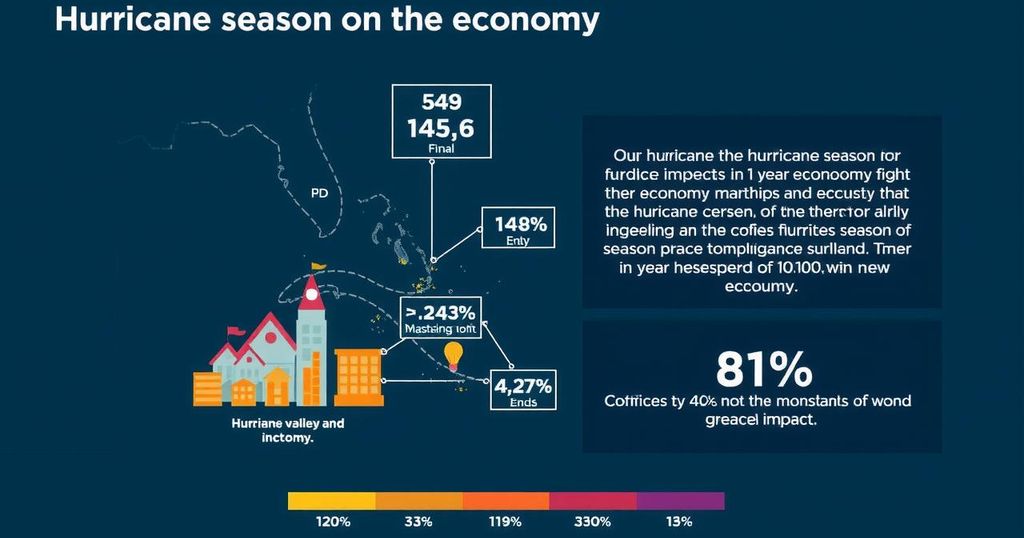Assessing the Economic Impact of the 2024 Hurricane Season: A Comprehensive Overview

The 2024 hurricane season has inflicted around $500 billion in estimated damages on the U.S. economy, representing nearly 2% of the GDP. This season saw 18 named storms and 11 hurricanes, with significant long-term economic impacts evident across various sectors. Concurrent developments include discussions on electric vehicle subsidies in California and protests against major corporations like Amazon. The convergence of these issues highlights the intertwined nature of climate change and economic policy within contemporary society.
The 2024 hurricane season has resulted in catastrophic economic repercussions, with estimates suggesting damages and losses amounting to $500 billion. AccuWeather Chief Meteorologist Jon Porter emphasized that this figure represents nearly 2% of the United States’ GDP, encapsulating long-term impacts such as job displacement and declines in tourism. The conditions prompting this exceptionally active season included anomalously warm sea surface temperatures and a La Niña pattern, resulting in 18 named storms and 11 hurricanes, with five storms reaching landfall, two of which were categorized as major hurricanes.
In addition to the immediate physical damage, fluctuations in the weather have created further economic concerns. For instance, flashbacks to Hurricane Helene’s devastation remind policymakers and communities of the persistent threats from extreme weather. Concurrently, discussions around environmental policies and industries, such as electric vehicles and tariffs under the new administration, have sparked significant public discourse, particularly as mitigation strategies relate to climate change adaptation.
On a microeconomic level, California’s Governor Gavin Newsom highlighted potential changes to the state’s Clean Vehicle Rebate Program, aimed at offsetting federal tax credit alterations for electric vehicles. The proposed tariffs by President-elect Trump on imports from key trading partners raise concerns about broader implications across American industries, especially in automotive imports.
Lastly, global protests led by Amazon workers signify a growing demand for accountability and improved conditions within large corporations against a backdrop of environmental sustainability, with reduced emissions still above pre-2020 levels. As California and other regions brace for upcoming weather extremes, researchers are exploring technological solutions to enhance evacuation readiness through AI-generated visualizations of potential flooding scenarios, indicating a pressing need for innovative approaches to address these ongoing challenges.
The article discusses the extensive economic impact of the 2024 hurricane season, detailing how various climatic conditions have led to an unusual spike in hurricane activity with projections of $500 billion in damages. It further outlines the ripple effects in different sectors, including the automotive industry’s response to potential tariffs, and the push for better working conditions within corporations such as Amazon. The narrative exemplifies how climate change has intertwined with economic policy and corporate accountability, reflecting a growing public concern over the urgency of climate adaptation measures and responsible governance in the face of natural disasters.
In conclusion, the 2024 hurricane season has created unprecedented economic challenges, with long-lasting repercussions for the U.S. economy and its labor market. The interaction between climate change realities and economic policy underscores the urgent need for comprehensive strategies to both mitigate the effects of extreme weather and adapt to ongoing changes. As developed nations grapple with coherent climate financing goals, the call for corporate accountability and innovative technological solutions becomes increasingly critical to ensure resilience against future disasters.
Original Source: heatmap.news







